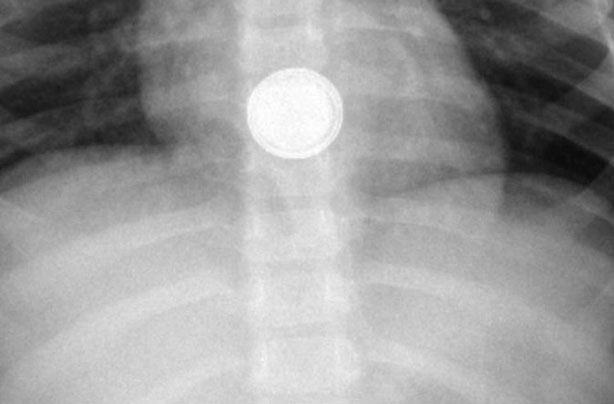Doctor issues warning to parents about the dangers of button batteries
It can lead to serious damage and even death

A doctor was warned parents about the dangers of button batteries for young children.
Lissy de Ridder, a pediatric gastroenterologist, issued the warning to parents on Twitter after treating three kids who swallowed them in just one week.
Alongside a picture of a an X-ray showing a button battery stuck in an oesophagus, she wrote: 'Removed 3 disc batteries only this week, stuck in esophagus of babies and toddlers. Damage is severe and lifelong in one of them. Truly individual and societal disaster. Parents, be warned! Please retweet.'
The warning caused many to also share their concern on social media, agreeing that parents need to be extra careful with button batteries around the house.
One said: 'Well done for publicising this. I was unaware of the particular danger these batteries pose until I had kids.'
Another wrote: 'Looked after kids in the PICU with eroded oesophagus - button batteries are small and shiny & very attractive for little ones - don't ever leave them lying around!'
It's not the first time the dangers of button batteries - which can be found in products like small remote controls, children's thermometers, and hearing aids - have been discussed.
GoodtoKnow Newsletter
Parenting advice, hot topics, best buys and family finance tips delivered straight to your inbox.
Last year, the dad of a two-year-old who died in Basingstoke after swallowing a spare battery opened up about his daughter's tragic death.
Without her parents noticing, Francesca had gone into a set of drawers at the family home, taken the 2cm battery out of its packaging and put it in her mouth, burning through her throat and causing fatal internal bleeding.
In a campaign with for Child Safety Week, her dad George Asan said: 'Unfortunately we didn't see anything wrong, no signs. We found that it was a button battery and straight away I went to the cabinet and we had the 3D glasses for the TV.
'It was one of the spare batteries, from the original box of the glasses, which was in another box. I don't think in any parent's mind, this is the first thing they'd look for.'
Ashley Pugh, a visiting healthcare practitioner who works with the Child Accident Prevention Trust (CAPT), explained: 'With button batteries, one of the risks is choking; another risk is the fact that, when they come into contacts with bodily fluid and liquid, they actually start to corrode the flesh. So if they come into contact with flesh or the stomach wall, within two hours they can cause very sever injuries and even death.'
The CAPT website advises that it's not always obvious to tell your child has swallowed a battery, so it's important to act fast and take them to an A&E if you think this might the case.
Batteries in children's toys should be covered by security regulations, so that kids can't easily open the battery compartment.
However, in order to avoid accidents, it's important to keep all spare batteries out of children's reach, ideally in a high-up, lockable cupboard; and keep products with batteries that aren't secured with a screw out of reach too.
Trusted, informative, and empathetic – GoodToKnow is the ultimate online destination for parents. At GoodtoKnow, our mission is 'simple': we're trying to make sense of parenthood. On the site, you'll find everything you need for a happy, healthy family life. Our huge archive of content includes more than 18,000 articles and 1,500 how-to videos. These include expert-backed advice features on parenting, dealing with relationship changes after having a baby, self-care for mums and managing your family finances. We also feature tried-and-tested product reviews and buying recommendations for every stage of family life - from prams and Moses baskets to birthday gifts and top toys.